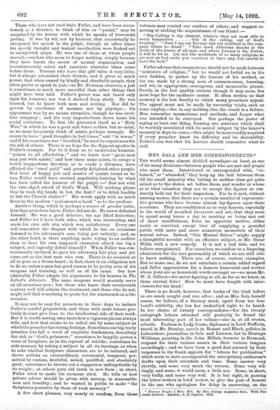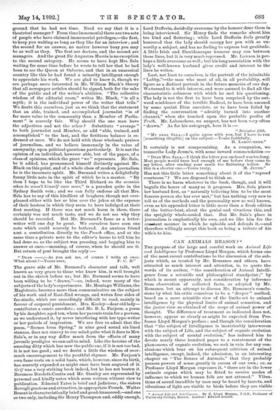MRS. SALA AND HER CORRESPONDENTS.* THE world seems almost divided
nowadays—at least, as one of its many divisions—between people who are met and people who meet them. Interviewed or corresponded with, "at- homed," or " abroaded," they keep up the ball between them till the small minority who belong to neither class get quite mixed as to the dishes set before them, and wonder at whose or at what valuation they are to accept the figures so con stantly held out for their inspection. For be it said, without naming names, that there are a certain number of representa- tive persons who have become almost lay-figures upon these occasions. They are established as so very famous, especially in the world of so-called literature and art, that they seem to spend many hours a day in meeting or being met out of sheer unselfishness, from no apparent motive, either social or convivial, except that of supplying a grateful public with more and more numerous memorials of their mutual selves. Indeed, "Our Mutual Selves" might supply a thoughtful novelist with an effective subject, or Mr. Oscar Wilde with a new comedy. It is not a bad title, and we believe unregistered. For ourselves, we confess to a lingering admiration for the rare personality of which we are still able to know nothing. There are, of course, various examples. But to name one, do we not entertain a certain added regard and fuller appreciation for a famous humourist and worker whose jests are as household words amongst us—we mean Mr. W. S. Gilbert—for never figuring at all, as far as we know, in these eternal lists ? How he must have fought with inter- viewers for his hand !
There is no doubt, however, that books of the kind before us are much sought and run after ; and as Mrs. Sala herself comes, we believe, of a literary stock, apart from her hus- band's celebrity, she has her undoubted right to be heard. In her choice of twenty correspondents—for the twenty autograph letters attached will probably be found the most interesting part of her volume—she is, at all events, eclectic. Fashion in Lady Jenne, diplomacy in Lord Dnfferin,
travel in Mr. Stanley, novels in Besant and Black, politics in Lalouchere, journalism in Sala and Lawson, law in Montagu
Williams, painting in Sir John Millais, humour in Burnand, respond for their various names in their various tongues aecoriiingly ; and we have been a good deal amused by their responses to the frank appeals for "letters for publication" which seem to have accompanied the enterprising authoress's drafts upon their attention and time. Some answer very shortly, and some very much the reverse. Some very wil- lingly, and some, it would seem, a little not. Some, in short, very badly, and some very well. It is but right, in passing the letter-writers in brief review, to give the post of honour to the one who apologises for delay in answering, on the
* Famous People I Have Met. By Mrs. George Augustus Sala. With Fad. simile Letters. London ; J. R. Osgood. 1892.
ground that he had not time. Need we say that it is a theatrical manager P From time immemorial there are two sets of people who have claimed immemorial privileges,—the first, to keep you waiting as long as they like for an interview; and the second for an answer, no matter however busy you may
be as well as they. The first are doctors, and the second are managers. And the great Sir Augustus Harris is no exception to the second category. He seems to have kept Mrs. Sala waiting for some time before he wrote to tell her that he had been to see the Queen at Osborne, and that in an unmusical country like this he had found a minority intelligent enough to appreciate his work. We are glad to know it, though we are perhaps more interested in Mr. William Black's theory that all newspaper articles should be signed, both for the sake of the public and of the writer's abilities. "The collective wisdom of the editorial room," writes Mr. Black, "is all a myth ; it is the individual power of the writer that tells." We doubt this ourselves, just as we think that the statement that an able, trained, and accomplished journalist "is of far more value to the community than a Member of Parlia- ment" is scarcely fair. Why should the one man have the adjectives and not the other P Substitute " average " to both journalist and Member, or add "able, trained, and accomplished" to the last, and the fictitious balance is re- dressed at once. We do not hold with these wholesale praises of journalism, and we believe immensely in the value of anonymity, upon political questions particularly. It is not the opinion of an individual, however able, but of the paper, of a class of opinions, which the great "we" represents. Mr. Sala, be it added, has pronounced himself distinctly against Mr. Black on this point, and of a whole class of modern journalism he is the incarnate spirit. Mr. Burnand writes a delightfully funny little note in the spirit of which he is a master. "By then I hope to be like the Third Richard on the occasion when he wasn't himself once more," is a paradox quite in the Sydney Smith vein ; and we can fully endorse all that Mrs. Sala has to say of this kindliest of laughers, though not over- pleased either with her or him over the jokes at the expense of their hostess in which they seem to have indulged at their first meeting. If there was not much harm in them, there certainly was not much taste, and we do not see why they should be recorded. But Mr. Burnand's fame as a letter- writer will one day be great. We ourselves have seen one note which could scarcely be bettered. An anxious friend sent a contribution directly to the Punch office, and at the same time a private note to the editor's house to tell him he had done so, as the subject was pressing, and begging him to answer at once,—meaning, of course, when he should see it. But return of post brought the reply DEAR —,—As you ask me, of course I write at once.
What about P—Yours ever, F. C. B."
The grave side of Mr. Burnand's character and talk, well known as very grave to those who know him, is well brought out in the sketch before us ; but Mr. Burnand seems to have been willing to be "drawn,"—as, indeed, were many of the subjects of the lady's experiments. Mr. Montagu Williams, the Magistrate, becomes more than communicative on the subject of his work and of East-End wrongs, and writes four sides of fac-simile, which are exceedingly difficult to read, mainly in favour of corporal punishment. Mrs. Keeley—dear old lady— contributes a comic anecdote; and Mr. B. L. Farjeon, a poem by his daughter, aged ten, whom her parents train for a poetess, as we understand it, by never interfering with her type-writer or her periods of inspiration. We are free to admit that the poem, "Scenes from Spring," in nine good sound six-lined stanzas, does not convey to our mind quite what it does to Mrs. Sala's, or in any way differ much from the effects of many juvenile prodigies we can call to mind. Like the heroine of the amazing ditty which has now the public ear, if it is not too bad, it is not too good ; and we doubt a little the wisdom of over- much encouragement to the youthful rhymer. Mr. Farjeon's own fame rests on a solid basis, which, however, since its birth, has scarcely expanded as might once have been augured of it. Grif was a very striking book indeed, but he has not beaten it. Baroness Burdett,Coutts and Mr. Stanley are represented by personal and kindly notes which seem written without view to publication. Edmund Yates is brief and judicious ; the sisters Ravogli gracious and attractive, in appropriate French. Walter Besant is characteristically brief and good-humoured,—and one or two only, including Sir Henry Thompson and, oddly enough,
Lord Dafferin, decidedly overcome by the honour done them in being interviewed. Sir Henry finds the remarks about him too kind and flattering ; while Lord Dufferin feels greatly honoured that the lady should occupy her pen with so un- worthy a subject, and has no feeling to express but gratitude. A little Irish and Sheridanesque humour may run between these lines, but it is very much repressed. Mr. Lawson is per- haps a little overcome as well ; but his long association with the lady's well-known husband gives credit and interest to the lines he writes.
Last, not least to ourselves, is the portrait of the inimitable "Labby,"—the man who most of all, in all probability, will figure as a distinct portrait in the future memoirs of our day. We turned to it with interest, and were amused to find all the characteristic calmness with which he met his questioning. The lady is not the first to have been surprised by the out- ward semblance of the terrible Radical, to have been amused by some quaint Eton anecdote, or to have been foiled by finding the conversation "adroitly turned into another channel," when she touched upon the probable profits of Truth. Mr. Labouchere, we suspect, has not been very often "drawn." As for his autograph, here it is
December 13th.
"My DEAR SALA,—I quite agree with you, but I have to run [something illegible] on the subject.—Yours faithfully, H. LABODCRERE."
It certainly is not compromising. As a companion, we transcribe Lady Jenne's, with some inward commendation :— "DEAR HRS. Sepe,—I think the letter you enclosed was too long. Most people would have had enough of me before they came to my letter, after reading your much too flattering notice. So this is a shorter one.—Yours truly, H. JEIINE."
Has not this little letter something about it of the "reproof courteous " P We are disposed to think so.
There is no harm whatever in the book, though, and it will beguile the hours of many as it proposes. Mrs. Sala places. herhusband first, as "naturally believing him to be the most famous person she has ever met," but has nothing very new to tell us of the methods and the personality now so well known, even as his appended letter is little more than a fresh edition of the butter-boat, about the genial and vivacious this, and the sprightly whole-souled that. But Mr. Sala's place in journalism is emphatically his own, and we like him for the constant manner in which he upholds and defends it,—and therefore willingly accept this book as being a tribute of his wife's to him.







































 Previous page
Previous page